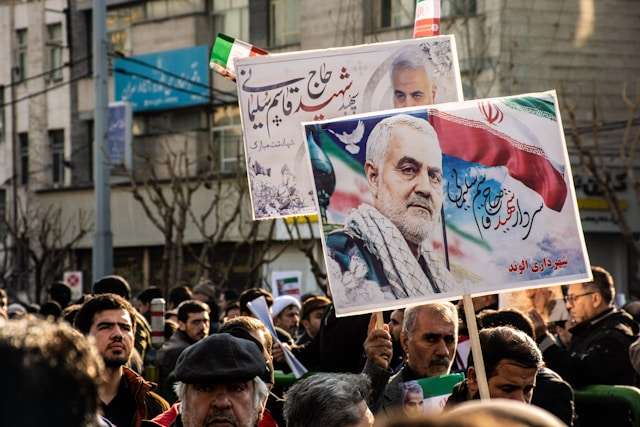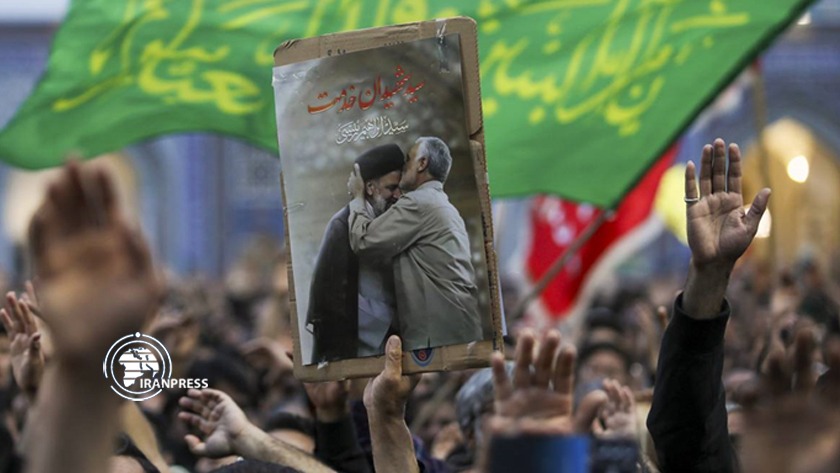Qasem Soleimani, a name that resonates deeply within the corridors of power and public sentiment in Iran, was more than just a military leader. He was a symbol of resilience, strategy, and unwavering commitment to his country’s revolutionary ideals. With a career that spanned decades and a life marked by significant influence on Iran’s military and foreign policies, Soleimani’s story is one of profound impact and legacy.
Table of Contents
Early Life and Background
Childhood and Family Background
Born on March 11, 1957, in the small village of Qanat-e Malek in Kerman, Iran, Qasem Soleimani’s early life was shaped by the modest socio-economic status of his family. Growing up in a rural area, he experienced the hardships and challenges that many Iranian families faced during that time. Despite these difficulties, his family’s strong work ethic and values played a crucial role in shaping his character.
Family anecdotes reveal a young Soleimani who was determined and resilient. His upbringing in a close-knit family instilled in him a sense of duty and responsibility that would later define his military career.
Education and Early Influences
Qasem Soleimani’s formal education was brief and unremarkable, but it was the early influences that truly shaped his worldview. The Iranian Revolution of 1979 was a turning point, igniting a passion for defending his country and its new ideals. His family’s perspective on his early years highlights a young man deeply committed to his beliefs and ready to take on whatever challenges lay ahead.
Military Career Beginnings
Joining the Islamic Revolutionary Guard Corps (IRGC)
In 1979, amid the fervor of the Iranian Revolution, Soleimani joined the newly formed Islamic Revolutionary Guard Corps (IRGC). This decision marked the beginning of a military career that would see him rise through the ranks and become one of Iran’s most influential military leaders. Initially assigned to suppress uprisings in Iran’s Kurdish region, Qasem Soleimani quickly demonstrated his leadership skills and strategic acumen.
Rise Through the Ranks
Soleimani’s dedication and tactical acumen quickly earned him recognition within the IRGC. During the Iran-Iraq War (1980-1988), he led several critical operations that bolstered his reputation as a skilled military strategist. His rise through the ranks was marked by significant promotions and commendations, solidifying his position as a key military leader.
Key Achievements and Strategic Roles
Leadership in the Quds Force
In 1998, Soleimani was appointed as the commander of the Quds Force, the IRGC’s elite unit responsible for extraterritorial operations. Under his leadership, the Quds Force expanded its influence, becoming a pivotal player in Iran’s regional strategy. Qasem Soleimani’s strategic vision and hands-on approach defined the Quds Force’s operational success.
Major Operations and Strategies
Iran-Iraq War
Qasem Soleimani’s military career was forged in the crucible of the Iran-Iraq War. His leadership in critical battles and his ability to inspire his troops played a crucial role in Iran’s resilience during this protracted conflict.
Lebanese and Palestinian Conflicts
Qasem Soleimani’s involvement in the Lebanese and Palestinian conflicts further demonstrated his strategic prowess. His support for Hezbollah in Lebanon and various Palestinian factions showcased his commitment to extending Iran’s influence and countering Israeli and Western interests in the region.
Syrian Civil War and Iraq
Soleimani’s strategies during the Syrian Civil War and the fight against ISIS in Iraq were instrumental in shaping the outcomes of these conflicts. His ability to coordinate diverse forces and develop effective military strategies underscored his significance in regional geopolitics.
Influence and Legacy of Qasem Soleimani
Impact on Iran’s Foreign Policy
Soleimani’s influence on Iran’s foreign policy was profound. He played a key role in shaping Iran’s relationships with neighboring countries and global powers. His strategic vision aligned with Iran’s broader goals of regional dominance and resistance against Western influence.
Public Perception and Popularity
Within Iran and across the Middle East, Qasem Soleimani was seen as a hero by many. His interactions with the public, often marked by humility and respect, endeared him to countless individuals. Personal stories shared by his family members paint a picture of a man who, despite his high-ranking position, remained grounded and connected to the people he served.
Death and Aftermath
Circumstances of His Death
On January 3, 2020, Qasem Soleimani’s life was abruptly ended by a U.S. drone strike near Baghdad International Airport. The attack, ordered by then-President Donald Trump, was justified by the U.S. as a preventive measure against imminent threats posed by Soleimani. The initial reactions from his family were a mix of shock, grief, and resolve, as they came to terms with the loss of a beloved father and husband.
Funeral and Public Mourning
The funeral processions for Qasem Soleimani were among the largest in Iran’s history, reflecting the profound impact he had on his country and its people. National and regional mourning activities underscored his significance, with millions paying their respects. His family’s experiences during this period were marked by a deep sense of loss, but also a recognition of the legacy he left behind.
Political and Military Consequences
The aftermath of Soleimani’s death saw significant political and military repercussions. Iran’s response included missile strikes on U.S. bases in Iraq, signaling the potential for escalated conflict. The long-term implications of his death continue to shape the Middle East’s geopolitical landscape. His family’s perspective on these events is a mix of pride in his legacy and concern for the future.
Detailed Analysis of Family Interview
Emotional Connection and Influence
Qasem Soleimani’s profound impact on his family is evident through the emotional recounting of their interactions with him. His daughter reflects on how he played the role of a father while maintaining his military responsibilities. The family members describe his emotional presence and the deep bond they shared with him, indicating his dual role as a family man and a military leader.
Perception of Martyrdom
Soleimani’s aspiration for martyrdom was a significant aspect of his life, as highlighted by his family. His conversations about martyrdom with his family reveal his ideological commitment and the personal sacrifices he was willing to make.
Physical and Mental Hardships
Accounts of Qasem Soleimani’s health issues, including the effects of chemical bombing, reflect his physical and mental resilience. His ability to continue his duties despite severe health problems underscores his dedication and endurance.
Personal Traits and Habits
Soleimani’s meticulous nature is highlighted through his attention to personal grooming and cleanliness. His preference for dark blue clothing and his meticulous nature about appearances reveal personal traits that carried over into his professional life.
Influence on Family Members
The interview reveals how Qasem Soleimani’s values and dedication influenced his family members. His teachings and examples left a lasting impression on his children and grandchildren, shaping their perspectives on life and duty.
Reflections on Legacy
Family members express a sense of pride and loss, reflecting on Soleimani’s contributions and the vacuum his absence has created. Their recounting of his last days and their interactions with him during this period provide a personal lens through which to view his legacy.
Historical Context
The Iran-Iraq War (1980-1988)
Qasem Soleimani’s formative years in the military coincided with the Iran-Iraq War, a conflict that significantly shaped his understanding of warfare and the role of the state in defending its sovereignty. His experiences during this war influenced his strategic thinking and leadership style.
The Formation of the Islamic Revolutionary Guard Corps (IRGC)
The establishment of the IRGC in Iran after the 1979 Islamic Revolution was a key development in the country’s military structure. The IRGC’s role in protecting the ideals of the revolution both domestically and internationally provided Soleimani with a platform to rise to prominence.
Iran’s Foreign Policy in the Middle East
Iran’s foreign policy strategies, particularly its involvement in regional affairs in countries like Syria, Lebanon, and Yemen, were significantly influenced by Qasem Soleimani. His leadership in the Quds Force played a pivotal role in strengthening Iran’s influence in these regions.
The Rise of Non-State Actors in the Middle East
The emergence and impact of non-state actors, including Hezbollah and Hamas, are crucial in understanding Soleimani’s broader influence in the region. His support for these groups was a key element of Iran’s strategy to project power and influence.
The Aftermath of the U.S. Invasion of Iraq
The 2003 U.S. invasion of Iraq significantly altered the regional power dynamics, providing Iran with new opportunities to expand its influence. Qasem Soleimani’s role in this context was instrumental in shaping the post-invasion landscape of Iraq and the broader Middle East.
Frequently Asked Questions
Who was Qasem Soleimani?
Qasem Soleimani was a senior military officer in Iran, serving as the commander of the Quds Force, an elite unit of the Islamic Revolutionary Guard Corps (IRGC). He was known for his influence in Middle Eastern geopolitics and his strategic role in expanding Iran’s influence through support of allied groups and militias in the region.
What was Soleimani’s role in the Iran-Iraq War?
During the Iran-Iraq War, Soleimani began his military career and quickly rose through the ranks. His experiences in this conflict significantly shaped his strategic thinking and leadership style, ultimately influencing his approach to military and geopolitical strategies.
How did Qasem Soleimani impact Iran’s foreign policy?
Soleimani played a critical role in shaping Iran’s foreign policy, particularly through his leadership of the Quds Force. Under his command, Iran supported non-state actors and allied groups in countries like Syria, Lebanon, and Yemen, thereby extending its influence and defending its interests in the region.
What were the key elements of Soleimani’s leadership style?
Soleimani was known for his meticulous nature, strategic mind, and unwavering dedication to his mission. His attention to detail in both personal grooming and military planning, along with his deep commitment to Iran’s revolutionary ideals, defined his leadership style.
How is Qasem Soleimani viewed in Iran and the broader Middle East?
In Iran, Qasem Soleimani is often regarded as a national hero and a martyr who dedicated his life to the defense of his country and its ideals. In the broader Middle East, his legacy is more complex, with some viewing him as a stabilizing force and others as a figure who contributed to regional conflicts.
What legacy did Soleimani leave behind?
Soleimani’s legacy is multifaceted. He is remembered for his significant contributions to Iran’s military strategy, his impact on regional geopolitics, and his role as a symbol of resistance and dedication. His strategies and actions continue to influence the Middle East, shaping its current geopolitical landscape.
Conclusion
Summary of Key Points
Qasem Soleimani’s life was a tapestry of resilience, strategy, and unwavering commitment to Iran’s revolutionary ideals. From his humble beginnings in Kerman to his rise as a revered military leader, Soleimani’s influence on Iran and the broader Middle East is undeniable.
Reflection on His Legacy
Qasem Soleimani’s legacy is multifaceted, encompassing his contributions to Iran’s military strategy, his impact on regional geopolitics, and his role as a national hero. His strategies and policies continue to shape the Middle East, leaving an indelible mark on the region’s history.
Final Words from the Family
In the words of Qasem Soleimani’s family, his legacy is one of dedication, sacrifice, and unwavering commitment to his ideals. Their reflections offer a personal glimpse into the life of a man who was both a beloved family member and a pivotal figure in Iran’s contemporary history.
For more in-depth analyses and historical insights, join our community of history buffs and geopolitical enthusiasts. Keep visiting [Documentary Times] and never miss an update on the most compelling stories from around the world.

